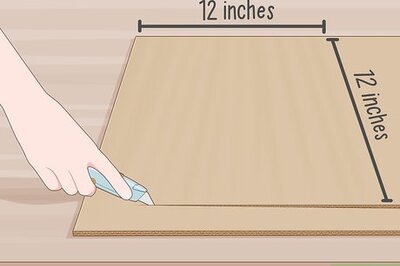
views
- Golden child syndrome is a family dynamic where a parent excessively favors one child over their siblings.
- If you were the golden child in your family, you might struggle with perfectionism, self-esteem issues, or setting boundaries with your parents.
- Establish healthy boundaries, let go of expectations, and prioritize self-care to help yourself heal if you grew up as the golden child.
What is golden child syndrome?

Golden child syndrome is a family dynamic where parents excessively favor one child. In the parent’s eyes, the golden child can do no wrong. Their attributes are exaggerated, and their faults are excused. The parent showers the child with attention and praise, whether or not they're actually displaying exceptional behavior. The golden child's sibling often becomes the scapegoat, who gets blamed for all of the family’s problems. If there are more than two siblings, one can become the lost child. This child is neglected because the parent is focusing on the golden child and scapegoat.
Signs You Might Be the Golden Child
You get special treatment from your parent. Your parent might be quick to forgive your faults, which means you can get away with a lot more than your siblings. If you feel like your parent brushes off your mistakes, but your siblings don’t get the same benefit of the doubt, you might be the golden child. You struggle with feelings of guilt. As you grow older, you could start to gain some insight into the treatment your scapegoat sibling went through, which could bring on feelings of guilt. Remember, you aren’t at fault for this dysfunctional family dynamic. Your parent was the one in charge of setting the tone. While experiencing these feelings of empathy toward your sibling, remember to extend them toward yourself, as well. You both did the best you could in a tough situation! You have an intense need to achieve. If you were the golden child, you received excessive praise all the time, and your parent expected you to be good at everything. As a result, you likely chase achievements in order to satisfy a craving for external praise. This could manifest as a need to be super successful in your career as an adult. You’re a perfectionist. Because you grew up with a parent who saw you as perfect, you could feel a lot of pressure to maintain that image. You're likely very hard on yourself and see failure as completely unacceptable. You might also put pressure on yourself to be good at everything you try. You’re a people pleaser. Because a difficult parent can be angry and unpredictable, you likely felt the need to be cheerful at all times to avoid the next big explosion. As an adult, this could cause you to neglect your own needs in order to avoid conflict with friends or partners. Remember, it’s normal to feel unhappy or upset sometimes, and you deserve affirmation even when you’re having difficult emotions. You have identity problems. A self-centered parent likely saw you as a projection of all their idealized notions about themselves and claimed your successes as their own. This could make it hard to separate your identity from your parent's. You might neglect your own needs and desires to focus on fulfilling your parent’s dreams. You have an inflated or deflated sense of self. Due to your parent’s excessive praise, you might have developed an inflated sense of your capabilities. On the other hand, your parent’s high expectations might have made you critical of yourself, leading to low self-esteem. If you’re dealing with super high or super low self-esteem, you’re not alone. It’s completely normal to struggle with self-image after being the golden child, and there are many ways to overcome these feelings.
Cause & Effects of Golden Child Syndrome
Cause: Golden child syndrome comes from bad parenting. It's especially common in families where one parent is a narcissist. The self-absorbed parent projects their good self-image onto the golden child, and their bad self-image onto the scapegoat. These roles are unrelated to the children's actual qualities. It doesn't matter how talented or well-behaved the scapegoat child is, nor how many flaws or bad behavior patterns the golden child has. The parent isn't interested in reality. Effects: Golden child syndrome has a negative effect on mental health. Former “golden children” often struggle with perfectionism, self-esteem issues, codependency, relationship struggles, and anxiety. They may even be at increased risk of being entitled or developing narcissistic personality disorder (NPD), just like their parent.
How to Overcome Golden Child Syndrome
Establish healthy boundaries. If you have a self-absorbed or narcissistic parent, they likely see you as an extension of themselves and demand constant access to your life. Establishing healthy boundaries with your parent can help you gain the space you need. Communicate your boundaries in a clear, direct way. Don’t try to over-explain or engage in a back-and-forth. Simply say your boundaries are not up for discussion. Enforce your boundaries if your parent isn’t honoring them. This might mean taking a break from communication with your parent. Examples: “Dad, I understand that you want to spend time together, but I’ve got a lot going on. I am free to have lunch every other week, if you want to catch up.” “Mom, I know you want to know what’s going on in my life, but I’m not comfortable introducing you to my partner yet. I’ll let you know when I am.” Go no-contact. Sometimes, a self-absorbed parent can’t respect your boundaries, no matter how hard you try to enforce them. If your relationship with your parent is having a negative effect on your mental health, you could decide to go no-contact. This is a hard decision, but the most important thing is that you’re able to heal and take care of yourself. Selfish people and narcissists are prone to manipulation and guilt-tripping, so your parent might try to fight you on this decision. Remember, you deserve peace and stability, and you are completely justified in cutting off contact. Let go of expectations. A difficult or narcissistic parent might be unable or unwilling to recognize your needs. No matter how well you explain your emotions, they still might not understand where you’re coming from. Letting go of expectations can help you move forward and prioritize your own needs. Be kind to yourself. If you're the golden child, you're likely super critical of yourself, and you might even blame yourself for the family's dynamic. Remember, your parent’s behavior isn’t a reflection of you, and the dysfunctional dynamic of your childhood wasn’t your fault. Practice self-compassion, which involves recognizing when you’re going through something tough and being kind to yourself in those moments. Try out some mindfulness exercises, like meditating or reciting positive affirmations to show yourself some love. Seek out treatment for mental health conditions. Golden children (and children of narcissists in general) are prone to issues like insomnia, anxiety, depression, and PTSD. If you’re struggling with any of these issues, you’re not alone, and there are many treatment options to help you manage symptoms. If you’re struggling with your mental health, scheduling an appointment with a therapist is a good first step. Ask trusted friends or family members for a referral if they see a therapist, or check out online directories.




















Comments
0 comment